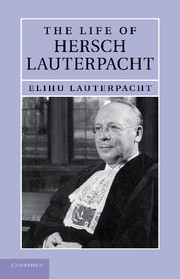Book contents
- Frontmatter
- Contents
- List of plates
- Acknowledgments
- List of abbreviations
- Prologue and introduction
- 1 Background and early years, 1897–1919
- 2 Vienna: research, engagement and marriage, 1919–1923
- 3 England and the London School of Economics, 1923–1937
- 4 Cambridge, 1937–1939: the Whewell Chair
- 5 The war years, Part I: September 1939–January 1941
- 6 The war years, Part II: February 1941–March 1942
- 7 The war years, Part III: April 1942–December 1944
- 8 Human rights
- 9 The years of practice, 1945–1950
- 10 1950–1954
- 11 The International Court of Justice, 1955–1960
- Epilogue: the man
- Appendix 1 The published writings of Sir Hersch Lauterpacht
- Appendix 2 Biographical and academic writings on Sir Hersch Lauterpacht
- Appendix 3 Obituaries of Sir Hersch Lauterpacht
- Appendix 4 Chronology of significant events in the life of Sir Hersch Lauterpacht
- Index
1 - Background and early years, 1897–1919
Published online by Cambridge University Press: 01 June 2011
- Frontmatter
- Contents
- List of plates
- Acknowledgments
- List of abbreviations
- Prologue and introduction
- 1 Background and early years, 1897–1919
- 2 Vienna: research, engagement and marriage, 1919–1923
- 3 England and the London School of Economics, 1923–1937
- 4 Cambridge, 1937–1939: the Whewell Chair
- 5 The war years, Part I: September 1939–January 1941
- 6 The war years, Part II: February 1941–March 1942
- 7 The war years, Part III: April 1942–December 1944
- 8 Human rights
- 9 The years of practice, 1945–1950
- 10 1950–1954
- 11 The International Court of Justice, 1955–1960
- Epilogue: the man
- Appendix 1 The published writings of Sir Hersch Lauterpacht
- Appendix 2 Biographical and academic writings on Sir Hersch Lauterpacht
- Appendix 3 Obituaries of Sir Hersch Lauterpacht
- Appendix 4 Chronology of significant events in the life of Sir Hersch Lauterpacht
- Index
Summary
Hersch Lauterpacht was born on 16 August 1897 in the small town of Żółkiew in Eastern Galicia. At that time, Galicia was the easternmost province of the Austro-Hungarian Empire, having been acquired by Austria as a result of the Partitions of Poland in 1772–96. In 1919, it reverted to its previous status as Polish territory, only to pass to the Ukraine in the aftermath of the Second World War.
Hersch's parents were Aron Lauterpacht and Deborah Turkenkopf. Although they had been married in a synagogue, this had not been accompanied by a civil process. As a result, Deborah was not officially ‘Lauterpacht’ and retained her maiden name. It is not known when she came to be known as ‘Lauterpacht’. For the first few years of his life, therefore, Hersch's surname was that of his mother – ‘Turkenkopf’. His given name at birth was ‘Hersz’, which was transliterated into ‘Hersch’. This was the name by which he was known to all except his childhood family and friends and his wife, who called him ‘Zvi’.
Hersch's father, Aron, was in the timber trade. Much of his business was conducted in the northern Polish ports of Gdynia and Danzig. In the latter he managed a factory making plywood boxes. During the years of the First World War, he also managed a large sawmill in what was then known as Lemberg (later Lwów and now Lviv), the capital of the province of Galicia.
- Type
- Chapter
- Information
- The Life of Hersch Lauterpacht , pp. 9 - 25Publisher: Cambridge University PressPrint publication year: 2010

